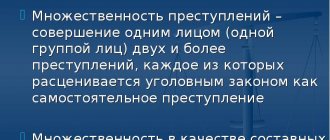In Russia, property is protected by law. But thefts of various things and objects occur every day, and victims turn to the police to report a crime.
The legislation of the Russian Federation defines the concept of theft, describes the main characteristics, and also provides for liability and appropriate punishment for the crime committed. All these norms are regulated in Art. 158 of the Criminal Code of the Russian Federation.
In our material we will tell you more about theft from the point of view of criminal law.
Definition, concept, as well as key features (under Article 158 of the Criminal Code of the Russian Federation)
Theft is a form of theft along with robbery, robbery, fraud, misappropriation or embezzlement. Like all other forms of theft, theft is the illegal seizure and (or) circulation of someone else's property.
Theft is an unlawful gratuitous seizure and (or) conversion of someone else's property in favor of the perpetrator or other persons, committed secretly and for selfish purposes, causing damage to the owner or other holder of this property.
Let's take a closer look at the key signs of theft.
Secret theft of other people's property
The key feature of theft is the secrecy of the theft. The secrecy of the theft must be maintained: neither the owner of the property nor other persons should see or know that the theft is taking place.
Will the theft cease to be secret if the following situation occurs:
Sergei, while in the library reading room, noticed that the caretaker had left the room. At this time, Anton, who was sitting at the next table, answered the call and also went out into the corridor.
Sergei did not see any other visitors, and therefore decided to steal Anton’s wallet from his bag. However, at that moment he was being watched by Kirill, a library visitor who was not visible because of the stacks of books.
The answer to this question is contained in the PPVS dated December 27, 2002 No. 29:
And in the event that Kirill, having read, did not see that theft was being committed, and in the event that Kirill saw, but Sergei did not understand that he was being watched and sincerely believed that he was stealing the wallet secretly, unnoticed by the owner and other persons , such an action will be classified as theft.
And even if Sergei’s relative observed the seizure of the wallet (provided that the culprit understands that the relative sees his actions, but expects that he will not stop him due to family relations), such an action will also be qualified by the court as theft.
But if a relative demands to stop the theft or otherwise begins to interfere with Sergei, then responsibility will already arise for the robbery.
Selfish goal
Theft, like other forms of theft, is characterized by the presence of a selfish goal.
So, for example, if a car was taken from the owner in order to impress someone with his “brave” act or simply to drive from point A to point B, such an act would be theft, not theft, and the person would be charged to liability under Article 166 of the Criminal Code of the Russian Federation.
In order for the seizure and (or) circulation of someone else's property to be recognized as theft, it must be gratuitous.
However, providing an unequal amount will not turn the seizure into a compensated one:
If Victor takes away an expensive laptop from Andrey, but puts 500 rubles in its place, hoping to avoid punishment by staging an exchange, the court will have to qualify Victor’s action as a gratuitous seizure, without deducting five hundred rubles from the amount of damage.
Secrecy as a method of theft when committing theft
IN THE COMMITMENT OF THE THEFT V.M. SEMENOV Semenov V.M., Candidate of Legal Sciences. An important objective feature that distinguishes theft from other forms of theft is the method of seizure of property. In the criminal law, the method is described as the secret theft of someone else's property. It is this circumstance that gives reason to consider theft the least dangerous of all forms of theft. Theft is secret if it is committed: - in the absence of anyone; - in the presence of the victim or unauthorized persons, but unnoticed by them; - in the presence of these persons observing the seizure of property, but not understanding the nature of the actions being performed and the significance of what is happening; - in the presence of any persons observing the actions of the criminal, understanding and correctly assessing their character, but not revealing themselves, due to which the criminal remains convinced that he is acting secretly; - in the presence of any persons observing the actions of the criminal, understanding and correctly assessing their character and not hiding their presence, but who are not strangers to the criminal in the sense that would allow us to talk about the openness of his actions <*>. ——————————— <*> Boytsov A.I. Crimes against property. St. Petersburg: YuTsP, 2002. The complete absence of eyewitnesses most clearly characterizes the essence of theft as a secret theft, in which the thief strives in the process of taking property to avoid visual contact with anyone, including not only the owner of the property or its owner, but also strangers who can prevent a crime or expose the criminal as eyewitnesses of the crime. In this case, not all persons who find themselves at the crime scene are considered strangers, but only those from whom the criminal cannot expect not only assistance, but even passive connivance in the theft. In this sense, the thief’s accomplices cannot be considered as strangers (otherwise any group theft would be open), as well as those persons with whom he is connected by such family, friendship and other close or trusting relationships that give him real reason to believe that these persons At the very least, they will not oppose the seizure of property, and, by and large, will contribute to exposing it later. From this point of view, theft does not cease to be secret when the perpetrator acts in front of relatives or friends, counting on their tacit consent, connivance or even approval. An example of a justified reclassification of the actions of a culprit from robbery to theft is the case of Zakharischev, who was found guilty by the South Ural City Court of the Chelyabinsk Region that, together with his friend Makeeva, he came into a room where he had previously been with the permission of his friend Lyapina, and stole a stereo radio with four cassettes belonging to Lyapina's mother. Based on the fact that he committed these actions in the presence of Makeeva, the investigative authorities and the court qualified them as open theft. Satisfying the protest to reclassify the crime, the Supreme Court of the Russian Federation proceeded from the fact that Makeeva was an acquaintance of Zakharischev. Having agreed among themselves, they came to the room where Zakharischev had previously been in order to drink alcohol and stayed there overnight. Zakharischev, seeing a radio tape recorder under the bed, suggested that Makeeva commit the theft, but she refused and subsequently was indifferent to his criminal actions. Thus, the concept of “stranger or other person” in whose presence the theft of personal property was committed does not apply to witness Makeeva. Zakharischev was aware that Makeeva was a close person to him, and was confident in maintaining the secret of the abduction <*>. ——————————— <*> Bulletin of the Supreme Court of the Russian Federation. 1995. N 2. P. 6. The second version of secrecy, associated with the theft of property, although in the presence of any persons, but secretly from them, requires objectively greater efforts from the thief, since depriving those present of the opportunity to observe the seizure of what is with them or in where they are present, property is often achievable only thanks to special skill, which is possessed, for example, by pickpockets who steal wallets, watches, the contents of bags, hand luggage, etc. In certain cases, in addition to “sleight of hand,” such a thief is also required to be able to quietly approach and leave with the stolen property. The third option occurs when some persons observe the seizure of property, but do not realize its illegality, due to which the secret is not the physical side of these actions, as is the case in the previous options, but their true meaning. Moreover, in some cases, the criminal simply takes advantage of the fact that, due to his youth, mental disability, intoxication or other circumstances, those present are objectively unable to understand the nature of the actions being performed and the significance of what is happening, in others - the ignorance of others about the ownership of the property (for example, when stealing things at train stations ), thirdly, the thief himself has to create the illusion of the legality of the seizure of property, resorting to various kinds of deceptive tricks and even acting out skillfully staged performances, thanks to which others get the impression that the thief is the owner of this property or a person acting on his behalf. Observing the very fact of taking possession of the item of theft, strangers present do not realize the illegal nature of the behavior of the culprit, believing that this property is not stolen, but is confiscated lawfully by a person authorized to dispose of this property. When qualifying these acts, mistakes are often made, since objectively the criminal acted openly and, from the point of view of an objective criterion, his actions fall more under the definition of robbery than theft. In such a situation, we must not forget that when recognizing the actions of a perpetrator as secret, the main criterion is not an objective, but a subjective criterion - the awareness by the perpetrator that he is acting secretly <*>. ——————————— <*> For more details, see: Komkov A.V. Decree. Job. P. 65. Thus, the secrecy of theft is assessed based on two criteria: objective, i.e. external in relation to the criminal (the absence of eyewitnesses to criminal actions or the presence of circumstances in which those present are not aware or obviously do not have an objective opportunity to realize the criminal nature of the actions, which is what the thief is counting on), and subjective, i.e. internal, based on certain objective prerequisites of a person’s belief that what he is doing is invisible or incomprehensible to others. In this case, the decisive criterion for establishing secrecy is the subjective criterion - the perception of the perpetrator that the property is being confiscated by him unnoticed <*>. Hence, the desire of the culprit to take possession of property secretly, even if his actions were noticeable to other persons, does not give grounds to qualify the act as open theft if the thief himself, based on the surrounding situation, was not aware of the fact of its discovery and believed that he was acting secretly. Conversely, there is no secret theft when the offender was convinced that his actions were obvious to the owner of the property or strangers, although in reality they went unnoticed. ——————————— Article by B.D. Zavidov “Criminal legal analysis of theft” is included in the information bank according to the publication - “Advocate”, N 5, 2002. <*> Zavidov B.D. Theft: criminal legal analysis. M., 2002. P. 11. At the same time, the priority of the subjective criterion does not mean at all that the objective criterion is of no interest. After all, the criminal’s subjective conviction of the secret nature of his actions must be based on certain objective prerequisites. Consequently, the conclusion about the presence of a subjective criterion should be based on the establishment of these prerequisites, and not on the unsubstantiated statement of the criminal. In this regard, it is important to know that the secrecy of the seizure either arises due to the objectively prevailing situation, or is created and ensured by the efforts of the subject of the crime or his accomplices. Since a secret method of seizure is a mandatory sign of the objective side of the theft, the persons ensuring the secrecy of the seizure (for example, standing guard) must be recognized as co-perpetrators of the crime committed. In practice, situations are also possible when a person who tried to commit theft secretly is caught in the act of the crime, without having time to carry out all the actions to confiscate the property. The reasons for this may be the unexpected appearance of strangers at the place of seizure of property, the unexpected appearance of owners who returned for something forgotten and found a thief in the apartment, etc. How to qualify what was done in this case? The theory of criminal law has answers to this question. Let us explain them with the following example. Suppose someone, taking advantage of the temporary absence of the cloakroom attendant and the absence of other persons in the foyer, entered the wardrobe in order to take possession of a fur coat, but did not have time to leave with it when the cloakroom attendant returned. The qualifications of a given person’s actions will depend on how he behaves in the future. And further developments of events can develop according to several scenarios <*>: ——————————— <*> Sitnikova A.I. Completed and unfinished theft with transformation of intent and modification of method // Criminal law: development strategy in the 21st century: Materials of the Second International Scientific and Practical Conference. M., 2005. P. 195. - the actions of a criminal who, realizing that he has been discovered, stops the theft and tries to escape, abandoning the property, constitute an attempted theft; - in the same case, when the criminal, having been noticed in the process of unfinished theft, despite this, continues to take actions to confiscate property, the theft, which began as secret, develops into open, i.e. robbery (part 1 of article 161 of the Criminal Code); - if, in this case, the culprit, having encountered resistance, also uses violence against the person who tried to prevent the final seizure of property or its retention immediately after seizure, then his actions must be qualified, depending on the nature of the violence used, as violent robbery (Part 2 of Article 161 Criminal Code) or robbery (Article 162 of the Criminal Code); - on the contrary, violent actions committed after the end of the theft in order to escape or avoid arrest cannot be considered as robbery or robbery and are subject to independent criminal legal assessment under the relevant article of the Criminal Code, depending on the nature of these actions and the consequences <*>. ——————————— <*> For more details, see: Boytsov A.I. Crimes against property. SPb., 2002. P. 316 - 317. Thus, violence committed by a person may be in some way connected with the theft he committed or an attempt on it, but in no way can it be a means of taking possession of property. In this regard, V.A. Vladimirov is correct about <*>. ——————————— <*> Vladimirov V.A. Qualification of theft of personal property. M., 1974. P. 50. If a convicted person, when committing theft, believes that he is acting secretly, then his actions must be qualified as theft. On May 24, 2000, by the Oktyabrsky District Court of Ulan-Ude, Republic of Buryatia, Piskunov was convicted under paragraph “e” of Part 2 of Art. 161 (part 1 of article 161) of the Criminal Code of the Russian Federation. He was found guilty of robbery causing significant damage to the victim. On February 10, 2000, Piskunov came to the kiosk to buy bread. Taking advantage of the fact that the saleswoman Badeeva turned away from the trays of bread, he openly stole a calculator belonging to Badeeva that was lying on the counter near the kiosk window and disappeared. The verdict was not appealed or protested in cassation. The Deputy Chairman of the Supreme Court of the Russian Federation in protest raised the question of reclassifying the actions of the convicted person from paragraph “d” of Part 2 of Art. 161 (Part 1, Art. 161) of the Criminal Code of the Russian Federation on paragraph “d”, Part 2, Art. 158 (clause “c” of part 2 of article 158) of the Criminal Code of the Russian Federation. On July 26, 2002, the Presidium of the Supreme Court of the Republic of Buryatia satisfied the protest, indicating the following. As follows from the case materials, Piskunov, both during the preliminary investigation and at the trial, claimed that he took the calculator from the counter at the moment when the saleswoman turned away and did not see his actions, after which he immediately left and did not hear any calls; committed theft due to his difficult financial situation, as he needed money in connection with the birth of his daughter in January 2000. The victim Badeeva testified that the calculator was stolen when she turned away from the trays of bread. She called out to the guy, but he disappeared. Thus, there is no objective evidence in the case that Piskunov knew that the victim saw his actions. According to Art. 49 of the Constitution of the Russian Federation, all doubts that cannot be eliminated are interpreted in favor of the accused. According to the law, the perpetrator of a robbery is aware that the seizure of property occurs openly. If the subject of a crime mistakenly believes that he is committing theft secretly, although in reality his actions were noticed by the victim or third parties, then what he did cannot be considered robbery. Seizure of property under such circumstances is classified as theft. Therefore, Piskunov’s actions should be qualified as secret theft of someone else’s property <*>. ——————————— <*> Resolution of the Presidium of the Supreme Court of the Republic of Buryatia dated July 26, 2002 in the case of Piskunov // BVS RF. 2003. N 9. P. 14. The absence of intent to turn the car and things into one’s own property, the actions of a person who has taken possession of someone else’s property with the intent of temporarily borrowing them, cannot be considered as theft. Resolution of the Presidium of the Tyumen Regional Court of July 2, 1999 in the Schwartz case (extract). Leninsky District Court of Tyumen Schwartz (previously convicted) was convicted under paragraph “b” of Part 2 of Art. 158 (part 1 of article 158), paragraph “b” of part 2 of article. 166 (part 1 of article 166) and according to part 2 of art. 325 CC. He was found guilty of the fact that on September 19, 1998, while intoxicated in the apartment of citizen Plesovskikh, he took advantage of the fact that he had fallen asleep, secretly, for mercenary reasons, he stole a leatherette bag containing documents in the name of the victim: a passport, military ID, employment book, documents for the right to drive a car and a technical passport for this car, as well as three keys worth 10 rubles each. every. Using these documents and keys, Schwartz stole a car belonging to the Plesovskys. The judicial panel for criminal cases of the regional court left the verdict unchanged. The Deputy Chairman of the Supreme Court of the Russian Federation in protest raised the issue of canceling court decisions regarding the conviction of Schwartz under paragraph “b” of Part 2 of Art. 158 (part 1 of article 158), part 2 of art. 325 of the Criminal Code of the Russian Federation and termination of the case in this part. On July 2, 1999, the Presidium of the Tyumen Regional Court satisfied the protest, indicating the following. The court's conclusion about the presence in the actions of the convicted person of signs of theft of someone else's property, as well as theft of documents, is unfounded, since Schwartz, having taken possession of the victim's car without the purpose of theft, wanting to temporarily use it, did not have the intention to turn the car and things into his own property, which is confirmed by the case materials. Taking into account the above, the verdict and ruling of the cassation court in terms of convicting Schwartz under paragraph “b” of Part 2 of Art. 158 (Part 1 of Art. 158) and Part 2 of Art. 325 of the Criminal Code of the Russian Federation was canceled by the Presidium of the Tyumen Regional Court and the case was dismissed for lack of corpus delicti; it was recognized that Schwartz was convicted under paragraph “b” of Part 2 of Art. 166 (part 1 of article 166) of the Criminal Code of the Russian Federation <*>. ——————————— <*> BVS of the Russian Federation. 2000. N 2. S. 21 - 22. Russian investigator, 2005, N 6
Modern problems of the institution of maintaining the prosecution before the court by the body of inquiry"
Comments on laws »
Gravity of the crime
What crime is theft? Depending on the circumstances, theft can be a misdemeanor, a moderate, or a felony. Let's take a closer look at these cases.
- Slight heaviness
Ordinary theft, not aggravated by qualifying features, is a crime of minor gravity, since the maximum term of imprisonment is 2 years.
- Medium severity
If the theft was committed not by one person, but by several, and they had a prior conspiracy to commit this crime, such theft will be considered a crime of medium gravity. This group also includes thefts committed:
- with illegal entry into a premises or other storage facility (but not into a home; if entry into a residential building or other residential premises was committed, then such an act will constitute a different offense);
- causing significant damage to the victim (the category of significant damage is estimated. Whether the damage caused by theft is significant or not is determined by the court, assessing the property status of the victim. The main thing is that such damage cannot be less than 5,000);
- from clothes, a bag or other carry-on luggage that was with the victim.
This means that a person who has committed one of these thefts can be released from criminal liability if he reconciles with the victim, makes amends for the harm caused to him, or if he turns himself in and in the future actively contributes to solving the crime. These possibilities are provided for in Articles 75 and 76 of the Criminal Code of the Russian Federation.
- Serious crime
In addition, Article 158 of the Criminal Code of the Russian Federation contains other elements of theft that are classified as serious crimes. So, for example, if the amount of stolen property exceeds 250 thousand rubles, or if the theft was committed not just by several individuals, but by an organized group.
Theft with illegal entry into a home, from an oil, gas, petroleum product pipeline, as well as from a bank account (or theft of electronic funds) carries a maximum penalty of 6 years in prison with a fine, and therefore is also a serious crime.
Composition and qualifying signs of theft
Any crime requires an object and a subject. In our case, the object of theft will be someone else's property. The objective side is characterized by the following points:
- the taking of property occurred without the consent of the owner;
- There were no owners or witnesses during the theft.
In this case, the criterion for the sacrament of theft should include the following points:
- the owner or other persons were absent;
- happened in the presence of the owner, but unnoticed by others;
- committed in the presence of persons who are not aware of the criminal intent of the thief;
- the criminal thought that no one had seen him, but neighbors noticed him or a surveillance camera was installed.
The subject of theft can only be a legally capable person who has reached the age of 14 years. The subjective side of this act suggests that the attacker intentionally committed it, wanting to take possession of someone else’s property, while pursuing selfish goals. Consequently, the thief subsequently planned to use the stolen property for personal purposes or wanted to sell the stolen property and receive a monetary reward for it.
Note!
Theft will be considered theft only if the criminal took possession of the thing, otherwise the crime is simply an attempt to steal.
In order to correctly classify the type of theft and assign the appropriate punishment, you should know the signs that characterize it as a criminal offense under Art. 158 of the Criminal Code of the Russian Federation. Determining the severity of the crime and the amount of punishment for the thief depend on these criteria.
Statistics in Russia
Theft of other people's property accounted for half of all crimes registered in January–February 2021. According to statistics from the Ministry of Internal Affairs during this period, the number of registered thefts was 110,728, of which 43,340 were solved.
According to the summary report of the Judicial Department at the Supreme Court of the Russian Federation, in 2021, 76,176 persons were convicted of theft, and 33 were acquitted. In total, 104,741 cases were received by the courts on charges of theft, 26,686 cases were dismissed, and 67,289 were sentenced sentences.
Responsibility measures
The term under the article for theft on an especially large scale increases to 8 years compared to the usual corpus delicti of this crime.
Thus, in accordance with the sanction of Part 3 of Article 158 of the Criminal Code for grand theft, a criminal can receive:
- fine from 100 thousand to half a million rubles;
- forced labor for up to 5 years;
- imprisonment up to 6 years with a fine of up to 80,000.
For the theft of a total amount of more than a million, the criminal faces only prison punishment. Its term is limited to 10 years. Additionally, the judge can also impose a fine of up to a million rubles.
Reasons for committing
The socio-psychological reasons for committing thefts, as well as other crimes, include:
- lack of proper educational and educational work in the field of law;
- loss or deformation of social and moral guidelines among certain groups of citizens.
Socio-economic reasons:
- economic crises;
- rising unemployment rates.
It is also worth examining the conditions for committing thefts, that is, those factors that contribute to this crime and facilitate its commission:
- neighbors don't know each other. In the event of a burglary, neighbors may not even pay attention to the removal of things from the apartment, since they do not know what the owners look like, which means they may not realize that the removal is illegal.
- the prevalence of places where stolen property is sold;
- for burglaries: the popularity of plastic windows as opposed to wooden ones (plastic window frames are easier to press through, which allows criminals to get inside with less effort);
- special behavior of victims: they may be inattentive to their bags or other things, fail to replace the locks of the entrance doors after losing the keys, and so on.
Prevention and prevention
It is worth concentrating specifically on those preventative and warning measures that every citizen can take to protect themselves from theft. In this case, according to experts, the crime can be prevented.
To prevent pickpocketing, the Ministry of Internal Affairs recommends:
- In crowded places, be vigilant about your bags and wallets, including their integrity, try to put your wallet or phone in your pocket so that they do not stick out from your clothes, thereby not attracting the attention of pickpockets.
- Do not count cash in front of other people, and also watch out for people who stand too close to you.
To prevent theft from homes:
- Install reliable protection for your home: bars on the windows, strong locks on the doors (high security locks), install an alarm system. Moreover, even an imitation of an alarm can scare away thieves and thereby protect you from theft.
- Do not tell strangers your work and vacation schedule, empty your mailbox on time (the presence of a large amount of paper correspondence in the mailbox is a clear signal of your long absence).
- Do not trust strangers with the keys to your apartment, do not tell where spare keys are kept. Also, do not store duplicates in easily accessible and obvious places: in mailboxes, under the rug at the front door.
- Regularly carefully inspect the entrance doors, windows and balconies for the presence of so-called “thieves' checks”: stretched threads, lying cookies. If these items are not damaged for a long time, persons intending to commit theft will understand that no one is watching the apartment, no one is inside, which means they can safely commit a crime.
- When entering the entrance, you should not let strangers inside. It is worth telling them to call the intercom of the apartment they are going to.
To prevent vehicle theft:
- Install the maximum possible number of anti-theft devices: locking the steering wheel, hood, wheels, gearbox.
- If possible, apply some bright distinctive signs to the car: large stickers, color airbrushing.
- Try not to leave bags, wallets, or other valuables in the car. They are the ones who can attract the attention of potential criminals.
People committing this crime
Social and psychological portrait of the person committing theft:
- Many people who commit theft do not have a permanent legal source of income, and almost one fifth have never had any work experience at all.
- Half of thefts are committed by persons under the influence of alcohol, and there is also a high percentage of criminals who engage in vagrancy.
- Research shows that persons who commit theft have very strong selfish motives that were formed in an environment that is negative towards social norms.
- Many of them, by the time they commit thefts, already have criminal experience, lead an antisocial lifestyle, and suffer from drug and (or) alcohol addiction.
According to statistics, theft has a high percentage of repeat crimes: almost 45% of people who commit theft already have a criminal record for a similar crime.
If we are talking specifically about pickpocketing, then it is predominantly committed by men; the most active age is 18–30 years.
These are people with acting skills, they can quickly gain trust, and after theft, they can disappear unnoticed into the crowd. Outwardly, it is not easy to distinguish a “pickpocket”, but you can pay attention to the presence of specific tattoos: the inscription “beetle”, an image of a spider, tattooed rings.









